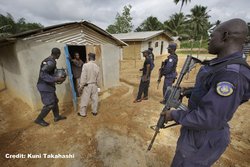
Palm oil giant Golden Veroleum has bulldozed religious sites in southeast Liberia and has paid police armed with assault rifles to protect its plantations, according to a new Global Witness exposé.
Palm oil giant Golden Veroleum bulldozes religious sites in Liberia, protected by armed police
Palm oil giant Golden Veroleum (GVL) has bulldozed religious sites in southeast Liberia and has paid police armed with assault rifles to protect its plantations, a new Global Witness exposé has revealed.
This comes fifteen months after the campaigns group published allegations that Liberians had been beaten, threatened and arrested for taking a stand against GVL, which accelerated its expansion at the height of Liberia’s Ebola outbreak. (1) GVL has bought the rights to convert 2,600 km2 of Liberia into an oil palm estate – an area the size of London and Barcelona combined. The company’s contract is valid for up to 98 years, currently affecting some 41,000 people.
These fresh revelations coincide with the publication of the first ever economic analysis of palm oil development in Liberia, which suggests that continued expansion under the current model could do the country more harm than good. The study, by economists at Sync Consult, found that converting community land into plantations left those impacted an average of three times worse off. (2)
Global Witness has been calling for Liberian President Ellen Johnson-Sirleaf to rethink the country’s approach to agriculture, which she has made a cornerstone of the country’s development strategy based on the belief that it will lift poverty in rural areas. Ten percent of Liberia is already earmarked for plantations, but expansion has happened in a legal vacuum – there are still no laws governing how agriculture companies should operate or be held to account.
“Our investigations show that Golden Veroleum is at it again in Liberia – intimidating communities through the threat of force. This time the company has also destroyed what’s most sacred to the people who have traditionally owned this land – a place they go to worship,” said Jonathan Gant at Global Witness. “Without laws and penalties to keep agricultural companies in check they will continue to get away with trampling over the rights and traditions of landowners across Liberia.”
Temple and Gun image Liberia with credit
Global Witness’ new investigation, called Temples and Guns, documents how GVL has cordoned off two sites that are sacred to the Blogbo people of Sinoe County. Palotro Hill, where women would pray for fertility, has been flattened to make way for a mill for processing palm oil. Tucked behind the construction site, the sacred Sleni River is now also off-limits and is at risk of contamination from waste water. When asked to comment, GVL did not deny it had desecrated these religious sites. Instead, the company states that it has not infringed upon the rights of the Blogbo people and points to a decision by the industry certification body the Roundtable on Sustainable Palm Oil. (3) However, locals interviewed say that GVL was never given permission to desecrate these sites.
These developments are taking place amid an atmosphere of fear and intimidation, with armed Liberian police installed to protect the company’s plantation. The Emergency Response Unit (ERU) was first despatched to the GVL plantation in May 2015 to pacify protests over staff’s working conditions. Its officers are still there, invited to stay by GVL to provide protection, and are being housed and fed by the company. As of November 2015, the ERU was also being paid by GVL, although when asked recently whether this is still the case the company declined to answer. They are armed with American-made M4 military rifles – some of the only guns left in an otherwise demilitarised country exhausted by 14 years of civil war.
Sync Consult’s analysis of GVL’s impact shows how the benefits to communities of the land they have traditionally owned, farmed and hunted on is four times greater than the value that GVL claims it will provide in salaries and social services once it converts the land into plantations. The economists also revealed how only a handful of people stand to gain from GVL – principally the company’s comparatively small staff and their families. Presented with these findings GVL did not give a substantive response, instead providing only general criticisms of the study’s methodology.
“This economic forecast paints a gloomy picture of the future of palm oil in Liberia, which threatens to deepen poverty and suffering across the country rather than lifting it,” said Jonathan Gant. “The government should be thinking very seriously about alternative development models – ones which strengthen the rural poor’s rights to the land they rely on rather than robbing them of it for generations.”











